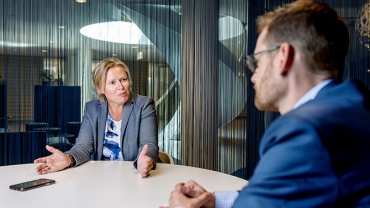
EU directive CSRD requires reporting and verification of sustainability information
Verification of sustainability information is rapidly becoming part of auditing. From 2024, the first of about 50,000 European companies including hundreds of Dutch ones will be required to report on sustainability under the EU's CSRD. That means integrated reporting of financial and sustainability information, and therefore also integrated assurance by the auditor. The search for an auditor who can provide assurance on both streams of information starts today.
An auditor who looks at both financial and sustainability information? Marcus Looijenga, a partner with PwC and an expert in ESG reporting and auditing, sees it as two worlds coming together. 'There’s a lot of overlap in this information and therefore synergy in auditing. That’s why I believe in an integrated approach and an integrated audit team.'

CSRD: an auditor for sustainability information as well
When the Corporate Sustainability Reporting Directive (CSRD) comes into force on 1 January 2024 for a certain group of companies, it will mean that they will also have to appoint an auditor for sustainability disclosures. Looijenga advises against appointing two different auditors. 'Sustainability used to be something you did on the side, but that’s a thing of the past. Sustainability is now embedded in a company’s business model. It either poses a risk or, on the contrary, creates value for the company and thus has a financial impact. That calls for an integrated audit,' Looijenga explains.
Embedding ESG in into strategy
Embedding ESG in the strategy requires a sharp, critical and well-informed look at sustainability policy and reporting. Daniel van Veen, a partner working in the ESG assurance practice, cites the low water level in the Rhine and its financial impact on companies as an example.
Due to climate change, the supply of glacier water and rainwater in summer is uncertain, resulting in the decrease of water levels in the Rhine. As a result, factories, for example in the Ruhr, miss supplies of raw materials, resulting in substantial financial losses. 'It's often about integrating sustainability into risk management and working through to the financial impact of those risks. That interaction requires an integrated team. It helps if the auditor knows the entire business well, that way his or her sound view, knowledge and experience help the company move forward.'
An integrated audit team supported by ESG experts
What does an integrated audit team mean for clients in practice? One team, one responsible partner and specialist support from ESG experts where needed. 'At PwC, we’ve started to upskill all our auditors on ESG so that the entire audit team can support every client in every area. We’re also working on data and technology solutions. Not only in order to work more efficiently, but also to be able to meet the challenges in the current labour market,' says Van Veen.
'Our auditors with ESG knowledge form the basis. We also have a large team of dedicated ESG auditors. And on top of that, we also have subject specialists in house, such as human rights experts, climate specialists and biologists,' Looijenga explains. 'If a dairy company wants to report on emissions and biodiversity, it’s essential for us to have someone on our team with a good understanding of nitrogen who can check the accuracy of the reporting.'
Value destruction in practice
That this is of great importance is shown by current events. For example, a well-known meal delivery company saw its stock price plummet because of how it treats its employees. An example of value destruction in practice. In addition, the Netherlands Authority for Consumers and Markets (ACM) recently reprimanded two well-known garment companies for 'unclear and insufficiently substantiated' sustainability claims. If the companies fail to deliver on the promised improvement, fines may follow.
'We all know about the scandals in the financial world due to misinformation. Within the sustainability world, the same thing will happen. This is precisely why ESG assurance is so essential,' says Looijenga.

The auditor's natural consulting role
New EU regulations are coming at businesses thick and fast. The number of KPIs on which reporting is mandatory is growing. 'But companies also choose their own KPIs that fit within the organisation's strategy and objectives. That soon becomes more diffuse,' says Van Veen.
As an example, he cites a supermarket chain's product range and reporting on the number of 'healthy products'. After all, the question is: what is healthy? 'It’s a matter of definition. As an auditor, you are often only involved at the end of the line. The auditor is seen as the final piece, but to me the natural auditor’s consulting role is essential in my business relationship with clients,' says Van Veen.
'We hold a mirror up to the board. Where do they stand? Are they taking the right steps? Where are the problems? How do they do this in other countries? These are the questions we can and must ask before and during the process,' Looijenga adds.
A new auditor? Set to work now on a transition plan
'In initial discussions with clients, I always refer to our own ESG ambitions and our sustainability reporting. This sets out what we achieve, how we report on it and what kind of impact we achieve with it,' says Looijenga. 'With reasonable assurance from our own auditor.'
Many companies currently have to get ready for the new legislation and a number have to change auditors at the same time, due to mandatory firm rotation. 'Organisations need to get the new auditor on board quickly so that assurance can be provided when the new legislation comes into force,' says Van Veen. 'So it’s important for the new auditor to be fully included in the preparation for this new legislation, from early on in the transition phase.'
Fully and from early on, what exactly does that mean? 'If a client needs to comply with legislation on 1 January 2024 in order to report on them in 2025, you need to engage with each other no later than 1 January 2023 - if not earlier - to understand what steps need to be taken,' says Van Veen.
Based on his experience, he stresses the importance of engaging with a broad and diverse group within the organisation. 'We listen to the client's needs, challenges, opportunities and risks. We look at all facets and identify the risks and put the opportunities on the table.' Looijenga nods in agreement. 'In terms of sustainability, it’s good if we as auditors are part of the transformation from the earliest stages. That helps both parties, so we always make that explicit in our transition plan.'
Non-financial information is going to become as important as financial information
To Looijenga, it is essential that we leave the world a better place. He is referring to his six-year-old daughter, who still has her future ahead of her. 'ESG and sustainability are such big topics. You can contribute to this from most professions. I do so as an auditor. That’s why I’ve always wanted to convey the importance of sustainability in auditing to other professionals.' For eight years, Looijenga taught 'Auditing & ESG Assurance' at the University of Groningen. Considering his motivations, this is a great complement to his role at PwC. 'If we work on it together, we can have a real impact.'
Van Veen is absolutely committed to using his experience and knowledge to make the move towards a sustainable economy easier. 'Today's youth, as employees and investors, will soon be looking not just at profit figures, but also at emissions, working conditions and other ESG elements,' says Van Veen. 'I don't pretend to know everything. It’s a quest we have to complete together. But there’s one thing I’m sure of, and that’s that non-financial information is going to become just as important as financial information.'




















